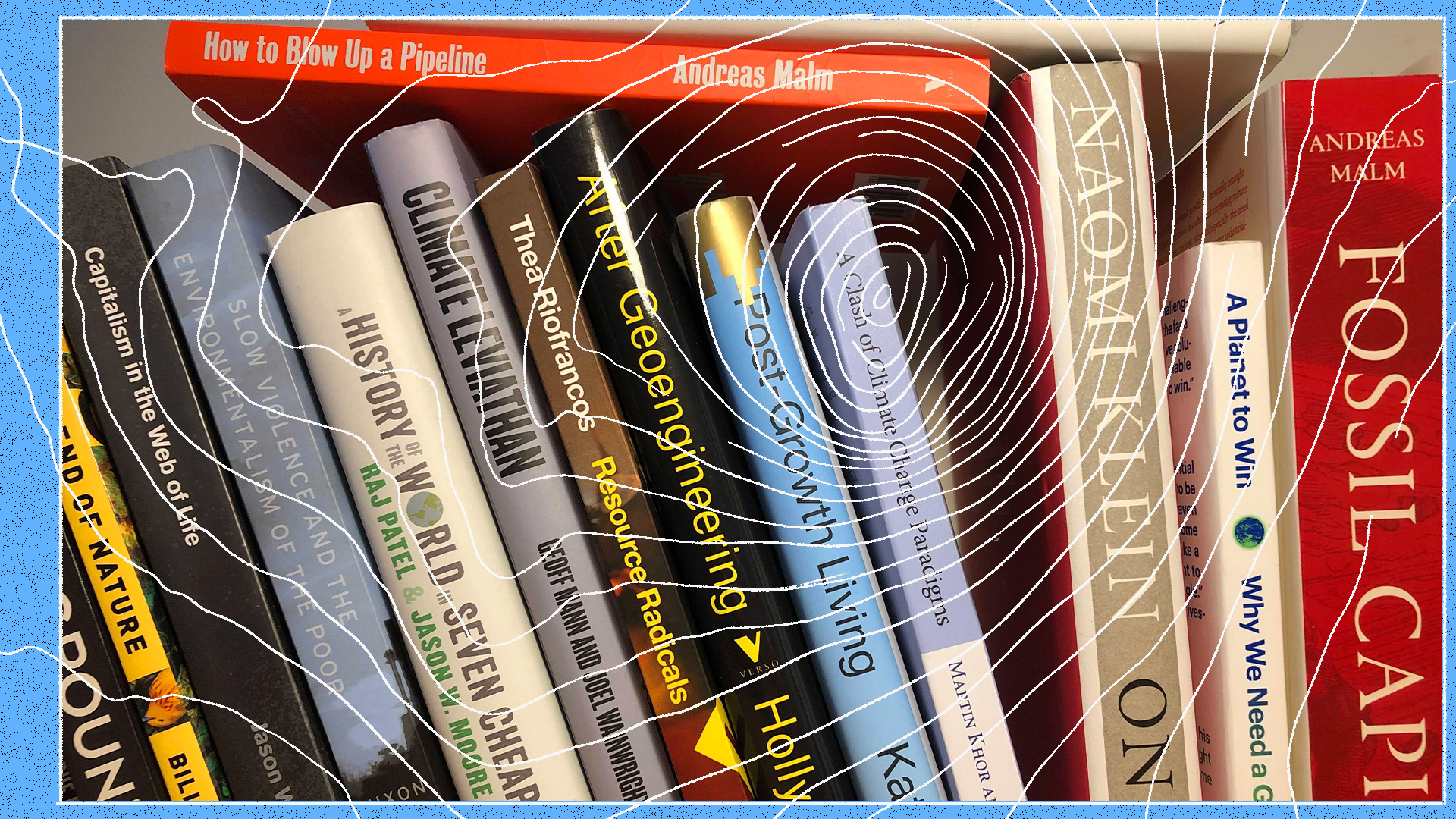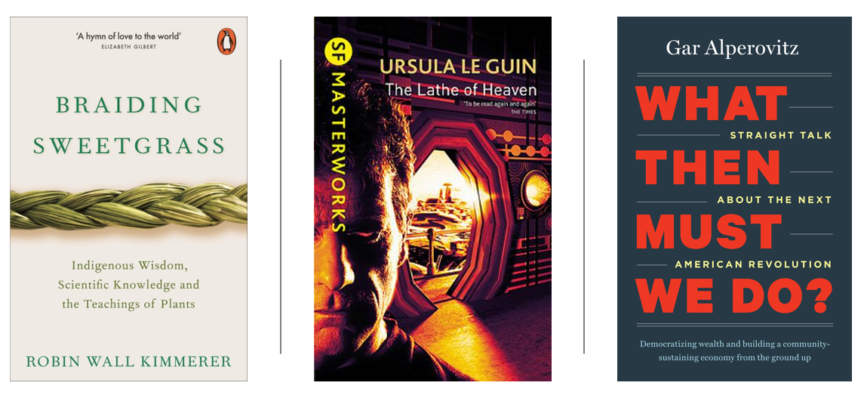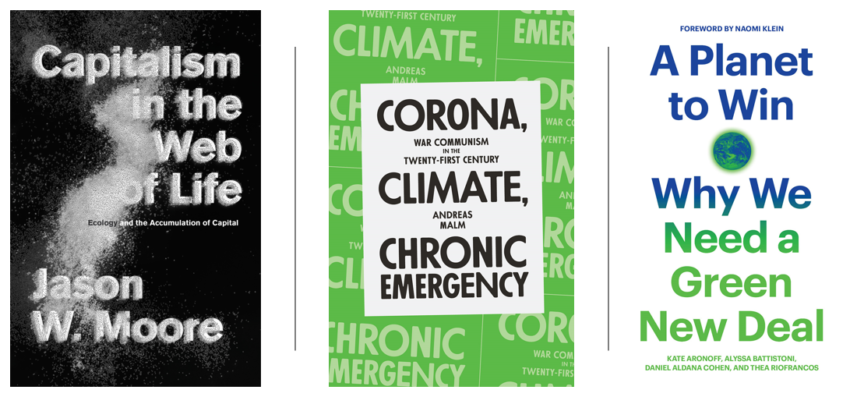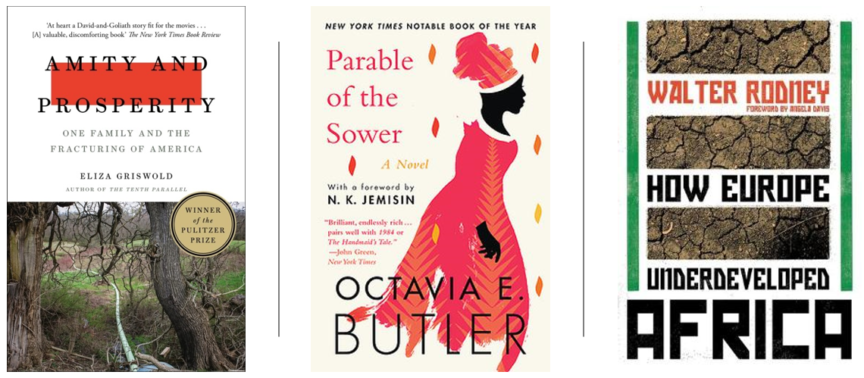9 Books for Getting to Grips With the Climate Crisis
by Gaya Sriskanthan, Chris Saltmarsh & Adrienne Buller
12 December 2020

It’s frequently said that the climate crisis is ‘too big’ for many of us to come to terms with. Getting a handle on the main issues – from the causes of global heating to how to decarbonise the world’s economies, from our relationship with nature to global climate justice – can seem a daunting prospect and leave us feeling powerless.
That’s why, to mark our current Climate Focus, we asked some of Novara Media’s friends to share their top reading recommendations for understanding climate breakdown and the challenges we will face over the next decade.
Gaya Sriskanthan, co-chair of Momentum
Indigenous communities are living testament to the fact that extractivist capitalism is not the sum of who we are as human beings, and that the answer to the question ‘how can we live sustainably?’ has been right under our noses this whole time. Successfully taking on the climate crisis will require more than policies and investment: it calls for nothing less than a fundamental cultural shift in how we relate to nature and to each other.
Braiding Sweetgrass by Robin Wall Kimmerer, a plant ecologist and member of the Native American Potawatomi Nation, is a moving meditation on Indigenous solutions to both the practical issues of sustainable living, as well as the trickier challenge of how we can construct a culture of gratitude for and reciprocity with the earth. Working people everywhere have had their own cultural practices and connection to the land erased by feudalism, patriarchy and the removal of the commons, and dismantling capitalism should include recreating our own sense of identity and connection with each other and the planet we depend upon. Indigenous communities show us how we can do that, as they reinvent and reclaim their own practices from the most brutal depredations of colonial capitalism – and this book is a great introduction to helping us think about what that means for the rest of us.

As we try to re-envision our crumbling civilisation, science fiction and fantasy writer Ursula Le Guin’s anticapitalist, feminist and Taoist perspective is essential reading. Of all her books, the most obvious choice would be her prophetic novel The Lathe of Heaven. Written in the 1970s, Le Guin lays out a dystopian world very similar to our own. Extreme weather due to climate change, check. Climate-induced poverty and food insecurity, check. Global plague, check. Endless wars in the Middle East, check. But honestly, I would invite you to plunge headlong into Le Guin’s collected works. Even her less seemingly profound novels, like the Earthsea series, contain beautiful observations on the ills of exploiting humans and nature and on the values and relationships we need to cultivate to re-balance the world.
Gar Alperovitz’s What Then Must We Do? is a great introduction to what the nuts and bolts of real system change could look like. A slim book, it lays out the building blocks for a new economy based on fairness and sustainability, including the kinds of collectively-owned and democratically-governed institutions we will require to bring forth a new system.
The most compelling thing about this book is that these are solutions we can all start building now at the local level. Instead of just sitting waiting for a revolution or a left takeover of government, the ‘checkerboard’ of strategies presented by Alperovitz are already silently at work all around us – they just need to be scaled. We don’t need control of parliament to start this work. In the UK, the Preston model is one such example that shows what can be achieved through local councils. Alperovitz reminds us that grassroots organising can help construct a more green and equitable economy more quickly than we realise.
Chris Saltmarsh, campaigner and author of a forthcoming book on climate justice (Pluto Press, September 2021)
To mitigate the inadequate liberalism that dominates the climate movement, the left needs to cohere around a socialist politics of climate justice to lead the next decade of struggle – not with behaviour change, misanthropic environmentalism or corporate net-zero targets, but by striking at the heart of capitalism with a transformative alternative and militant collective action.
Jason W. Moore’s book Capitalism in the Web of Life is a challenging read with high rewards. For me, the book really clarified the fact that we cannot separate the struggle for workers’ liberation from environmental crises or climate injustice. The exploitation of labour and the appropriation of nature (extraction, enclosure, etc) are joined at the root, as mutually central to the capitalist process of accumulation. Moore advocates a new system of organising nature (including human society) that prioritises justice, ecology and wellbeing over capital accumulation.

As calls for a ‘green recovery’ from Covid-19 abound, Andreas Malm’s Corona, Climate and Chronic Emergency, provides an unrivalled clarity of analysis on the lessons we can learn from the pandemic for tackling the climate crisis. Malm’s account traces the way capitalist development produces pressures (rising temperatures, deforestation, livestock industry) which lead to zoonotic spillover and climate impacts, while the social vulnerabilities capitalism produces (austerity, privatisation, fortified borders) mean both phenomena are experienced as disaster. Malm argues the climate movement needs militant politics and strategies to address these interconnected crises in colonial capitalism, which means a relentless mobilisation of state capacity in the face of climate emergency.
With A Planet to Win, Kate Aronoff, Alyssa Battistoni, Daniel Aldana Cohen and Thea Riofrancos offer the most persuasive pitch for a green new deal yet, arguing that the left’s response to inseparable injustices should be a state-led programme of investment and economic transformation. Although US-centric, their contribution is outward-looking and internationalist in scope, rejecting conceptions of a green new deal within the borders of one nation by calling for new global solidarities and the reconfiguration of the role of the US in international trade and governance. Their vision of a green new deal unequivocally ties together the climate crisis and social inequalities in both cause and solution, while presenting an unapologetic antagonism towards the fossil fuel industry and capital. At the same time, it is serious about reconciling the need to extract mineral resources for the technologies of a green new deal with the injustices laden within those processes. It should inspire the left to develop complimentary demands for democratic ownership and resource sovereignty to resolve an outstanding contradiction while undermining capitalism’s central (and most destructive) mode of reproducing itself.
Adrienne Buller, senior research fellow at Common Wealth and a Novara Media columnist
The idea of a ‘just transition’ has become a rallying cry for the left, and advocates of the green new deal in particular. But it’s not often enough that we genuinely engage with what the idea means, in all its complexity. Amity and Prosperity, Eliza Griswold’s sensitively recounted story of a family affected by the fracking boom in rural Appalachia under the Obama administration, is an important and sobering reminder of how far we have yet to go in understanding what a just transition is, and the power of the corporate and legislative forces we’re up against.
The book follows Stacey Haney, a single mother, after she and several neighbours in the former steel region of Washington County, Pennsylvania, sign contracts for fracking on their land. Tracing a series of tragedies – including a mysterious, debilitating and long-term illness on the part of her teenage son – the book offers a clear counter to the idea of natural gas as being in some way ‘cleaner’ or a ‘transition fuel’. But it’s also much more than that – with honesty and compassion, Griswold recounts the impossible battle faced by Haney as she challenges corporate power through the courts. As such, it’s an important book for the Biden age, and an emerging climate politics that risks echoing the failures of the Obama era, whether supporting fracking or further alienating communities who are too often maligned, neglected and rightfully outraged. Above all, Griswold’s book is a reminder that energy is not some abstract, technocratic policy domain – it is fundamentally political, and deeply human.

When it comes to Octavia E. Butler’s 1993 classic Parable of the Sower, ‘prescient’ is an understatement. The novel follows its young protagonist, Lauren, through a harrowing future (set in 2024) as she records her life in Los Angeles amidst climate crisis, water shortage, stark wealth and racial divides, and widespread suffering under the rule of a despotic leader. It’s dystopian, and often horrific, but the enduring power of Butler’s novel is not based in shock value, nor even its unnerving accuracy in crafting the future. It’s Lauren’s rare condition – ‘hyperempathy’, enabling her to feel the suffering of others – that keeps me coming back to it, urging us to reflect on our responsibility to others and capacity for compassion in an age of constant crisis.
On the one hand, Walter Rodney’s How Europe Underdeveloped Africa isn’t technically a ‘climate book’. On the other, it’s without a doubt one of the most essential books for anyone in the climate movement – and beyond – to engage with to understand justice on a global scale. As the US looks to rejoin the Paris Agreement under an incoming Biden administration, much of the climate movement is allowing itself a moment of celebration. And while the occupancy of the White House by someone who is not an outright climate denier, and who has made major spending commitments on clean energy, offers some relief, this book is an urgent reminder of how critically short current international commitments fall of what is needed not only to keep global temperatures within a habitable range, but to deliver any modicum of justice in doing so.
Leaders from the small island states to major African nations called the Paris Agreement’s 2°C target a ‘death sentence’ and repeat the mantra of ‘1.5 to stay alive’; meanwhile we remain on track for closer to 3°C or warming – or more – and climate finance commitments remain unmet. In this context, Rodney’s book offers a scathing, meticulously argued and richly supported account of just how much the affluent – largely white – world owes its comparative wealth and security in the face of climate crisis to generations of exploitation, enslavement and extraction.
- The Climate Focus is part of Novara Media’s Decade Project, an inquiry into the defining issues of the 2020s. The Decade Project is generously supported by the Rosa Luxemburg Foundation (London Office).